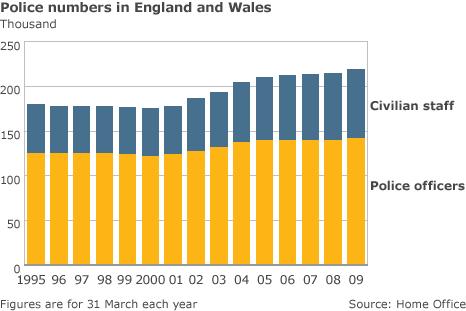Police 'must do more' despite cuts - home secretary
- Published
Chief constables must get more officers on the beat despite tough spending cuts to come, the home secretary has said.
Theresa May told the Association of Chief Police Officers they must use budgets in the most useful way.
"Front-line availability should increase even as budgets contract," she said, pledging to be "ruthless" on waste.
The association's president Sir Hugh Orde had said it would be "misleading in the extreme" to claim police numbers were sustainable in the face of cuts.
Both addressed senior officers from England, Wales and Northern Ireland at Acpo's annual conference in Manchester on Tuesday.
Mrs May also announced she was scrapping immediately the performance targets and minimum standards introduced by Labour and would press on with her plan for locally-elected police commissioners.
Sir Hugh had earlier told the BBC that with 83% of the policing budget being spent on staffing, it was likely that numbers would be reduced in the coming years.
He told the conference: "The harsh reality is that depending on the severity of cuts, it would be misleading in the extreme to suggest the size of this service is sustainable.
"Salami slicing which we've done before will not deliver the level of cuts we anticipate.
"We have to strike a difficult balance between the understandable demand for more and more officers on the streets... and the less visible but equally critical duties every chief constable undertakes on behalf of the citizens."
Sir Hugh urged ministers to save cash through structural reforms, suggesting forces might merge units and back-office functions, or share expensive equipment, but warned that force mergers were unpopular with voters.

He has asked the government for more detail on how plans to introduce locally elected police commissioners will work but said operational independence remained key.
Mrs May said independence would not be compromised.
But she said accepting a new type of accountability was the price of scrapping targets and Labour's 10-point policing pledge, which included commitments to respond quickly to calls and keep victims informed about their case.
"Targets don't fight crime," she said.
"I couldn't be any clearer about your mission... it is to cut crime. No more, and no less."
On budget cuts, Mrs May added: "We're not talking about a spending a freeze or a reduction of 1% or 2%. The cuts will be big: they will be tough to achieve.
"I will be ruthless in cutting out waste, streamlining structures and improving efficiency."
However, she said this could only go so far and that chief constables would have to increase the visibility and productivity of officers and community support officers.
Delegates were told that police officers and staff must also be ready to "make sacrifices" and "accept pay restraint".
Meanwhile, Mrs May said the government was considering co-ordinating the procurement of items such as vehicles, uniforms and IT nationally, while Acpo is examining how forces buy and organise resources.
Ministers have mooted mergers between collaboration between forces to use civilian staff for paperwork duties.
Dale Bassett, of think tank Reform, agreed civilians might be "better suited" and "cheaper" for some roles.
"It's really important that chief constables start to get out of this mindset that uniformed officers are the only way to go," he told BBC Radio Five Live.
Responding to Mrs May's speech, Derbyshire Chief Constable Mick Creedon said removing the policing pledge was "bold, brave and necessary".
But his Lancashire counterpart Steve Finnigan said that "quite a few chief constables... would say targets can be very helpful" in fighting crime.
Last week, Metropolitan Police Commissioner Sir Paul Stephenson said his force would "shrink" as a result of budget cuts.